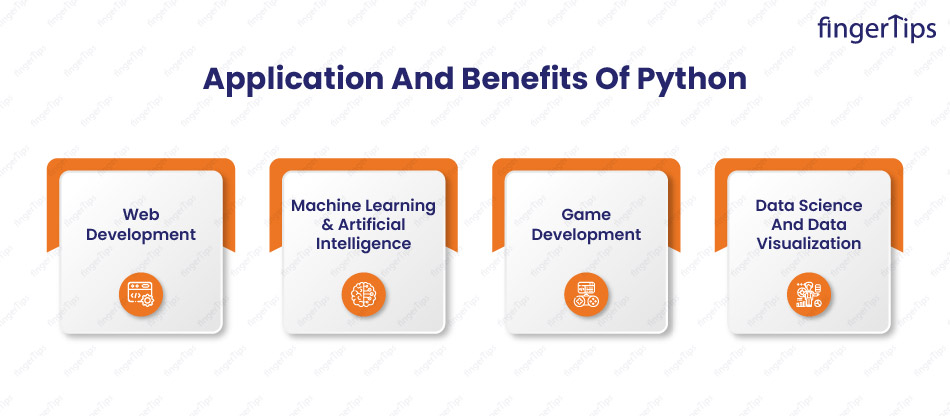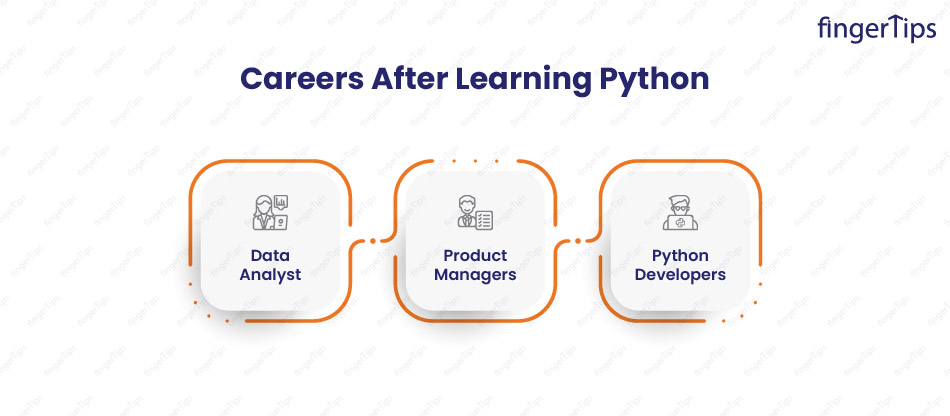Python has undoubtedly become one of the most used programming languages among professionals like data scientists, data analysts, business analysts, data engineers, and more. One of the most widely used programming languages today, Python is a flexible and potent language that has become the standard choice for many applications. Python has opened the way for quick development, innovation, and solving issues across a variety of sectors thanks to its simplicity, accessibility, and rich libraries. The language, as said, being flexible is applicable in every aspect, be it machine learning, artificial intelligence, building websites, software, and more. In this blog, we'll see how learning Python will help you and what are the applications and benefits of Python. Let's begin the guide.
What Is Python? Why Learn Python?
Python is the most used programming language by professionals for developing websites, software, and more. This general programming language implies it isn't invented for a specific task. So, Python being versatile and beginner-friendly, makes it a favorite programming language among technical people.
Along with this, Python has a huge set of libraries, modules, and data structures that helps an individual with programming. Now that we're aware of what is Python, let's see the top reasons to learn Python.
High Demand
The first reason for this programming language is the high demand for Python developers, which ultimately provides great career and salary opportunities. Along with other companies, many of the big and renowned companies, like Netflix and Google, are looking for skilled Python developers. Also, if you're from a technical background, you might know that Python is one of the most used programming languages in data science. So, if you're willing to become a data scientist, learning Python could be the first step in your career.
Beginner Friendly
As mentioned, Python is a favorite and the most appropriate language for beginners. The reason is pretty simple. The most difficult thing for a new person to learn to code is to learn a new language. But, with Python, this isn't the issue. Python syntax is very similar to English, like reading normally, this makes understanding codes very easy for beginners.
Supportive Community
Well, indeed, programming doesn't require a team, but an individual might require help or guidance from time to time if he is a beginner or if he is trying something new. Well, with Python comes a huge group of supportive communities. There are local meet-ups, online groups, and forums where people can ask their doubts, and whoever knows the solution can help with the problem.
Widely Applicable
Python's widespread use in a variety of industries has greatly contributed to its unrivaled popularity. Python has repeatedly shown its adaptability and use in fields ranging from building websites and data analytics to artificial intelligence and computational science. As a result of its numerous libraries and frameworks, developers can easily complete challenging tasks. It is a good choice for large-scale applications because of its performance and scalability. Python's wide range of uses makes it a crucial tool, whether it's for creating online apps, automating processes, or delving into the fields of data science.
So, these are some of the top reasons why you should learn Python. Not to mention there are multiple other reasons too to support the topic. Now, it's time to move to our next topic of the guide, which is the application and benefits of Python in the real -world.
Application And Benefits Of Python.

Since we're repeatedly mentioning that the Python programming language is widely applicable, you must wonder how it applies in real-world situations, so let's explore that too.
Web Development
Due to its robust libraries like Django and Flask, Python is frequently used in web development. A fast and effective method for creating dynamic web pages and online apps is offered by these frameworks. Python's readability and clarity make its code simple to comprehend and maintain, and its wide library support makes basic web development jobs easier to do.
Lear Data Science and Grow your Career-Enroll Now
Machine Learning & Artificial Intelligence
Python is widely used in applications for AI and machine learning. Its libraries, including TensorFlow, Keras, and Scikit-Learn, offer a strong environment for creating and refining machine learning models. Data initial processing, extraction of features, and model evaluation are all made easier by Python. Python's integration features also allow for simple interaction with additional artificial intelligence (AI) tools like NLTK and OpenCV for computer vision and natural language processing, respectively.
Game Development
Frameworks like Pygame and Panda3D offer a wide range of tools and functionalities for making 2D and straightforward 3D games. Python's intuitive syntax and wide-ranging library support enable game creators to prototype and create games quickly. Python is also well suited for merging with additional video game creators and engines due to its integration possibilities. The language provides a user-friendly framework for game development, allowing creators to concentrate more on game logic and design than low-level programming complexity, whether they are making independent games, designs, or educational games.
Data Science And Data Visualization
Python's extensive ecosystem of libraries makes it a popular tool for data research and data visualization. Libraries like Pandas, NumPy, and SciPy offer strong tools for data manipulation, examination, and statistical computations. Charts, plots, and graphs can be made that are both aesthetically pleasing and educational, thanks to Python's visualization packages, such as Matplotlib and Seaborn. Additionally, interactive and dynamic visualization features are provided by frameworks like Plotly and Bokeh. Thanks to Python's rich library support, data scientists can quickly explore and analyze massive datasets, derive insights, and effectively convey their findings through aesthetically pleasing visuals and visualizations.
These are only a few illustrations of the numerous applications that Python can be used for. Many developers choose it because of its adaptability and broad library support, enabling them to creatively address complicated challenges across many fields. Now, if you're wondering who should learn the Python language, we've got you covered. Let's see this in the guide.
Who Should Learn Python?
Python is a popular and adaptable language for programming that can be useful for a variety of people. The following categories of persons can gain from studying Python:
- Beginners: Due to its ease of use and readability, Python is frequently suggested as the initial programming language for beginners. Its big community offers a wealth of learning resources and support, and its syntax is simple.
Learn data Science and become Python Expert-Explore Now
- Students: Python is regularly taught in schools and colleges due to its ease of use and adaptability. It can be applied to various instructional tasks, such as maths, data analysis, computational science, and even the creation of straightforward games.
- Data scientists: Python is now the preferred analytics and data science language. It contains a robust ecosystem of libraries, including SciPy, Pandas, and NumPy, which offer strong data analysis, manipulation, and visualization capabilities.
- Web developers: Python provides a variety of frameworks, such as Django and Flask, that make web development duties easier. It offers a readable and effective codebase to build dynamic websites, web apps, and APIs.
- Whether it's file fraud, web scraping, or managing a system, Python's robust automation capabilities and user-friendly interface make it the best language for building scripts or automating repetitive chores.
- Artificial intelligence and machine learning: TensorFlow, Keras, and PyTorch are a few of the libraries that have helped Python become very popular in the AI and ML fields. These libraries give programmers the tools to efficiently implement machine learning algorithms and build and train sophisticated neural networks.
These are only a few instances, and Python can be useful for a wide range of professionals and even beginners. In today's tech-driven environment, its adaptability and wide library support make it a useful language to master.
Prerequisites And Eligibility
There are no specific prerequisites for learning Python because it is a programming language suitable for beginners. Python is made to be used by people with different degrees of programming expertise. Here are some things to think about:
- Basic Computer Literacy: Having a working knowledge of computers and how to use them will be beneficial. The learning process will go more smoothly if you are familiar with terms like file systems and directories and fundamental actions like opening up, saving, and running files.
- Problem-Solving and Logical Thinking: Programming requires thinking logically and solving problems. Although not a legal need for eligibility, having a logical mentality and the capacity to deconstruct complex issues into simpler ones can considerably help learn and use Python.
- Your learning process will be considerably aided by having access to learning tools, including tutorials, instructional books, and coding exercises. Anyone enthusiastic about learning Python has access to these materials, which are widely distributed online, and many of which are free.
Apart from these, the most important skill is consistency and motivation. It takes motivation and perseverance to learn any programming language. Python is no different. Your ability to successfully master Python will be strongly influenced by your will to study and your willingness to face obstacles. The most crucial prerequisite for learning Python is an interest in and commitment to learning programming. Whatever your educational background or prior experience, you may start your Python journey if you have the correct attitude and access to learning tools.
Careers After Learning Python

Wondering what positions will be available after learning Python programming? Let's explore the top career options for you after learning Python:
Data Analyst
Data analysts are those who carry out the process of data analysis. The data analyst is in charge of working with company leaders and decision-makers, presenting them with the information's results, and making recommendations. Although it may seem straightforward, working as a data analyst requires great responsibility.
Product Managers
Product managers are crucial in assisting organizations in comprehending the industry and why one product would be superior to another in development. They conduct market research, look for novel features relevant to a specific product or category, and support the development of specific goods using data. They focus a lot of their efforts on data. Because of this, most businesses nowadays are looking for product managers proficient in Python.
Python Developers
The most straightforward career path for someone who knows Python as a programming language is becoming a Python developer.
A Python programmer is anticipated to:
- Create webpages and enhance data algorithms
- Fix data analytics issues
- Putting security and data protection into practice
- Writing efficient, tested, and reusable code
Many of the businesses registered require Python developers. With this, now you're all aware of why Python is the most preferred programming language and what are the career options after learning Python. This was it for the blog guide of Python tutorial for beginners. Let's proceed to wrap up this guide.
Conclusion
In summary, the purpose of this Python tutorial for beginners is to provide you with a strong foundation in Python programming. We went through all the fundamental Python ideas and features in this course, giving beginners the confidence they need to begin their programming journey. Beginners should feel confident building Python programs now that they know this lesson as they gradually take on more challenging tasks. To make these ideas stick in your mind, you must put them to use in practice. Remember that learning Python requires patience, practice, and a desire to learn. Your abilities will be improved, and the path to your development as a Python programmer will be paved by consistently investigating new sources, participating in coding exercises, and looking for real-world projects.







